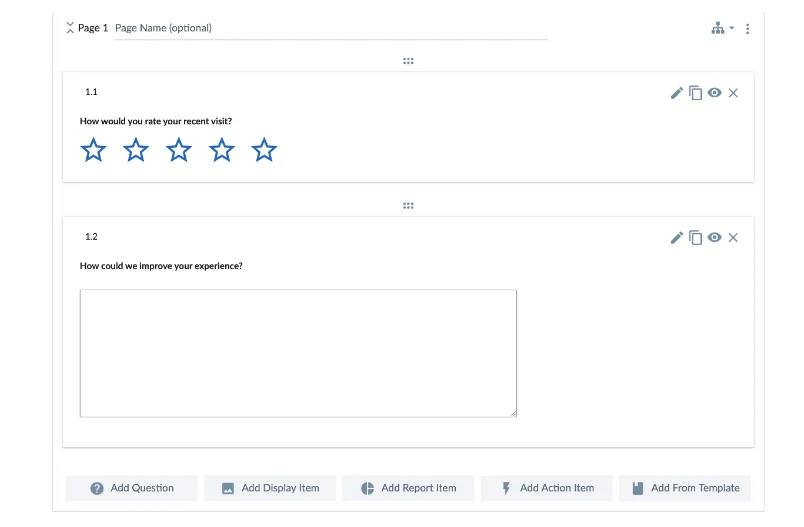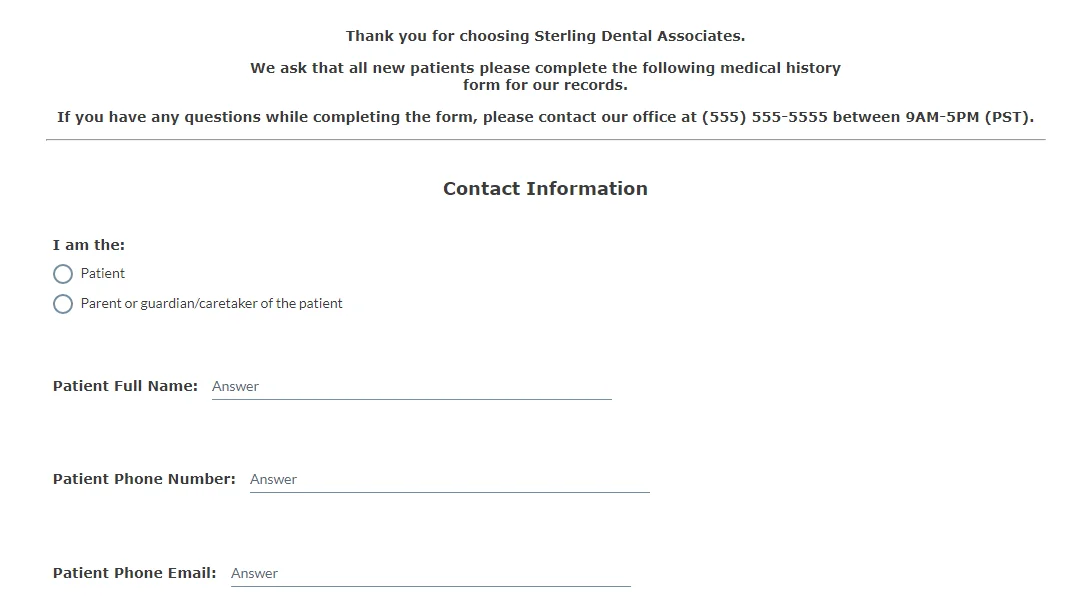Types of Healthcare Surveys: What You Need To Know
As healthcare providers implement new technologies, services, and processes, they also look for ways to improve their patients’ experiences.
According to the Hospital Compare program from The Centers for Medicare & Medicaid Services (CMS), hospital ratings are one way to help consumers make informed decisions about where to seek care.
To achieve a higher ranking on these scales, hospitals need to create patient surveys and other healthcare surveys which collect data on specific areas of improvement.
Conducting a healthcare survey is much easier when you have the right healthcare survey tool. At Checkbox, our healthcare survey software helps you to create online surveys that look elegant on any device. What's more, Checkbox allows you to create custom links and QR codes that you can use to seamlessly share surveys via email, SMS, or social media campaigns. Integration options and real-time reports ensure you are always on top of the essential data. If that sounds interesting to you, don't just take our word for it; request a demo.
In this article, we’ll be running through the various types of healthcare surveys available so you can make an informed decision about which is right for your business. We’ll also be providing health survey examples and sample questions to inspire your own healthcare surveys.
But first, let's explore what we mean by a healthcare survey.
What is a healthcare survey?
A healthcare survey is a study conducted to collect data about a particular healthcare issue. Healthcare surveys gather information about various topics, such as patients' satisfaction with hospital care, the quality of care they receive, and the cost of care. Surveys for healthcare professionals about their experiences in the workplace and how to improve it also come under this banner.

Healthcare professionals, government agencies, human services, and private organizations can conduct healthcare surveys at national, state, or local levels.
The value of surveys in the healthcare industry
There are numerous advantages to both patients and healthcare professionals in regularly conducting surveys in the healthcare sector. While surveys can uncover crucial insights into the patient experience and how to improve it, surveys for healthcare professionals can also reveal staff competency levels and support assessments related to the effectiveness of internal systems and processes.
From the patient care side, a healthcare survey such as a health risk assessment survey can help medical professionals to identify which patients need additional support during their hospital stay, while a patient follow-up survey can identify those who require further assistance upon being checked out. A survey can ask specifics about what kind of additional care or support patients would like to see at different points in their healthcare journey, and reveal if anything is missing from their current experience. A post-discharge survey is another great example of how to continue a conversation about patient needs, monitor a patient's progress, and prevent readmission after a hospital stay is completed.
By asking relevant questions at appropriate moments, and in a manner that is both empathetic and relatable, a healthcare survey tool can garner patient opinions about their whole healthcare journey with a specific provider, from the first interaction to out-patient care. A survey can also be a chance for healthcare providers to demonstrate the value they place on their patients' experiences, and show their team’s ongoing efforts in providing the best patient experience possible.
How to improve your healthcare survey
The best healthcare surveys are designed to provide teams with reliable and actionable insights from which they can make tangible improvements to the level of care offered to patients. When the right questions are asked in the right tone and presented in the right setting, high response rates and high quality data are practically guaranteed. So, how do you do this? Here are some of our top tips for crafting a successful healthcare survey.
1. Define your goals
Before writing your questions, decide what you want to accomplish with the data you are hoping to collect. With your goals in mind, you’re in a much stronger position to create questions that help you deliver on them and you’re less likely to confuse patients with unrelated or rambling content.
2. Keep your survey short and to the point
With each question crafted with the aim of helping you reach your stated objective, your next step is to keep your survey as short as you can. Shorter surveys have higher response rates and are less likely to be abandoned by patients. Keep each question as simple and concise as you can, with as little room for ambiguity as possible.
3. Use a mixture of closed and open-ended questions
While closed questions–questions that require yes or no answers, are multiple choice, or use a scale–are great for providing you with data that can be easily measured, compared, tracked, and analyzed, open-ended questions are valuable for gathering supportive evidence. While your survey is likely to be made up of mostly closed questions, consider including open-ended questions too; these give your survey some variety and offer patients a chance to air their views.
4. Keep the order logical
After a short introduction to the survey and an explanation of what it will involve, you’ll want to start by asking patients broader-based questions before narrowing the scope and digging into the details. Try to collect more general, demographic data at the start of the survey and leave more sensitive topics to the end.
For even more information, check out this post we’ve written all about creating optimal patient satisfaction surveys.
The advantages of electronic healthcare surveys
While in the past surveys were often handed out to patients in-person or conducted over the phone, these days more and more healthcare providers are opting for online healthcare surveys which can be sent via email, SMS, or via a QR code. By using the latest healthcare survey software, organizations can distribute their surveys significantly faster and to a more tailored audience at the click of a button, while participants can enjoy increased flexibility in terms of how and when they fill the surveys out. With information collected automatically by a healthcare survey tool, response times from patients are significantly shorter, results are more accurate, and with no intermediary required to enter details correctly, the margin of error is also reduced. Finally, an electronic healthcare survey is more flexible for healthcare professionals to work with: the order of questions can be altered and questions omitted altogether depending on how a participant has responded to previous questions.
From our extensive experience working with healthcare organizations we know about the specific needs in this industry. Here you find more information about how we fulfill healthcare requirements.
Types of healthcare surveys
There are many types of healthcare surveys, each with a unique purpose. Here are some of the most common:
Patient experience surveys
Patient experience surveys are a valuable tool for healthcare organizations. They provide insights into how patients feel about their care and can help identify areas that need improvement.

Surveys can assess various factors, including wait times, staff attitudes, and the quality of care. Apart from measuring patient satisfaction, they can also help to identify trends over time or monitor patient’s health condition. Some examples of such surveys include:
- Dental plan survey
- Health plan survey
- Women’s health issues survey
- Men’s health issues survey
- Eye care survey
- Diet and exercise survey
- Height and weight survey
- Life habits survey
Just like customer satisfaction surveys, patient experience surveys can be conducted in various ways, including online, by phone, or in person. They can be administered to patients at all stages of care, from appointment scheduling to post-discharge follow-up.
Patient surveys can be an essential part of continuous quality improvement efforts and can help healthcare facilities provide the best possible care to their patients.
Health survey example
1. How involved did you feel in making choices about your treatment and care?
- Very involved
- Quite involved
- Neither involved or uninvolved
- Quite uninvolved
- Very uninvolved
2. How would you rate your interactions with the medical and administrative staff during your visit?
- Excellent
- Good
- Satisfactory
- Unsatisfactory
- Very bad
3. Did you have any issues arranging an appointment? If yes, please elaborate further.
- Yes
- No
4. How would you rate the overall care you received at our healthcare facility?
- Excellent
- Good
- Satisfactory
- Unsatisfactory
- Very bad
5. Did you feel all of your questions were answered during your appointment?
- Yes
- No
Caregiver experience surveys

Caregiver experience surveys are a vital tool for healthcare organizations to gauge the level of satisfaction and engagement of their employees. By understanding the needs and wants of caregivers, organizations can make necessary changes to improve the work environment and the quality of healthcare services. Happy and engaged caregivers are more likely to stay with an organization, which reduces turnover and recruitment costs.
It's essential that the questions are well-crafted and that the survey is easy to understand. Otherwise, you run the risk of getting inaccurate or incomplete responses. While creating your survey, you can model your questions after the most important customer survey questions.
When creating a caregiver experience survey, be sure to include questions about
- Job satisfaction
- Burnout
- Workload
- Support from management
You should also ask caregivers how they would rate the quality of care they can provide.
By getting detailed feedback from caregivers, you can make the changes needed to improve employee well-being and satisfaction and, as a result, the quality of care your organization provides.
Caregiver experience survey example
1. Do you feel your work as a caregiver is valued?
a. Yes
b. No
2. Do you feel you have the equipment and materials you need to care for your clients?
a. Yes
b. No
3. Do you feel you have enough time with each of your clients to perform your job to the highest standard?
a. Yes
b. No
4. Do you find your workload reasonable?
a. Yes
b. No
5. What do you think could be done to improve the caregiving experience for clients and caregivers? Provide as much detail as you need.
Employee experience surveys
An employee experience survey is a tool that healthcare organizations use to measure employee engagement and job satisfaction.
Industry leaders know how vital employee satisfaction is for the overall performance of healthcare facilities. Therefore they don't hesitate to use enterprise survey software to conduct employee experience surveys.
The survey usually consists of a series of questions about different aspects of the job, such as the work environment, workload, and relationships with co-workers and supervisors.
The benefits of employee experience surveys include
- the ability to identify areas of the job that are most important to employees
- building trust and communication between management and doctors, nurses, and other members of the hospital staff
- providing valuable data on what can be changed to improve overall hospital performance
You can conduct employee experience surveys online, by mail, or in person. You can administer them to all employees or a representative sample. Such surveys can be anonymous or confidential.
Employee experience survey example
1. Do you feel that work is distributed evenly across your current team?
a. Yes
b. No
2. Do you feel valued by your colleagues and/or manager?
1. Always
2. Sometimes
3. Never
3. How closely related are your daily tasks to your skills and qualifications?
1. Very related
2. Fairly related
3. Not related
4. How happy are you at work?
1. Very happy
2. Quite happy
3. Neither happy nor unhappy
4. Quite unhappy
5. Very unhappy
5. Do you think that the management team is transparent enough about its processes and decision making?
a. Yes
b. No
Hiring process surveys

The healthcare industry is constantly changing and evolving, which means that the hiring process for healthcare positions has to adapt as well. One of the best ways to keep up with the latest trends in healthcare hiring is to use surveys.
This type of healthcare research allows you to collect feedback from both candidates and hiring managers about the hiring process. It can be a valuable tool for ensuring that your process is efficient and effective.
When creating a healthcare survey for the hiring process, there are a few things to remember. First, ensure that the questions are relevant to your hiring position. You'll also want to ensure that the questions are clear and concise and that they're not too leading. Finally, give respondents enough time to answer the questions thoughtfully.
With Checkbox, you can build healthcare survey templates that will help you enhance your healthcare hiring process.
Hiring process survey example
1. On a scale of 1 to 10, how satisfied were you with our recruiting and hiring process? 1 = Very unsatisfied, 10 = Very satisfied
2. Would you recommend our organization to other friends looking for a new role?
a. Yes
b. No
3. On a scale of 1 to 10, how helpful was the recruiter throughout the interview and recruitment process?
1 = Very unhelpful, 10 = Very helpful
4. How can we, in your opinion, make our hiring process better? Use as much detail as you need.
5. Was it clear what you needed to do to prepare for the interview? If you answer no, please elaborate.
a. Yes
b. No
Summing up
Healthcare surveys are a valuable tool for healthcare organizations. They provide insights into how patients feel about their care and can help identify areas for improvement. As surveys for healthcare professionals, they can also provide valuable insights into healthcare working environments, processes, and practices that could benefit from review.
The best healthcare surveys are created with the hospital's or medical practice's needs in mind. It means taking the time to understand the different types of surveys available to your business and selecting the type most appropriate for your needs.
Checkbox is a tool that will help you create any healthcare survey you need in minutes. It will help you build beautiful, mobile responsive surveys, distribute them and gather feedback with automation and email alerts. If you are wondering whether SaaS or on-premise survey software would better fit your organization, we have good news: Checkbox offers both options.
No matter which model you prefer, sign up for a Checkbox demo today to see how we can meet your survey needs.
Contact us
Fill out this form and our team will respond to connect.
If you are a current Checkbox customer in need of support, please email us at support@checkbox.com for assistance.




